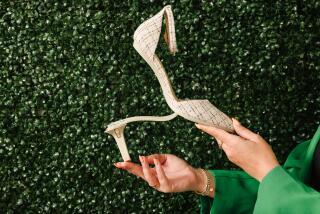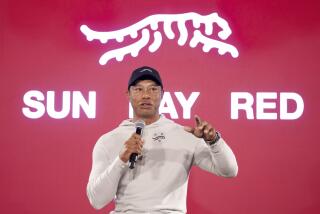Niche Filled by Triathletes : Going Distance, Coming Up Shorts
- Share via
Jim Riley gave up his crisply starched white-collar shirts and his gray suits in 1982, leaving his position as branch manager for Xerox in Los Angeles with plans of starting up a fitness clothing company in his native New Zealand.
However, after learning of his country’s tight restrictions on importing preconstructed clothing, Riley turned his sights south to San Diego, where he could work part time, learn the rag trade and continue one of his favorite activities: training for triathlons. Riley, then 41, never thought he would stay in San Diego long enough to pilot his own business.
Today that business, Perfection Sports Fashions, employs 42 people and distributes to 50 states and 15 countries. Thanks in large part to the company’s affiliation with triathlete Scott Tinley, who is Perfection’s vice president, estimated that sales were about $8 million in 1988, the company’s fifth full year in business. Perfection, which began as a division of Sewco Inc., has been independent since 1987.
A Specialized Breed
The company has carved a niche for itself by concentrating on providing clothing for a specialized breed of customer, the triathlete.
Riley, the company’s president, refused to discuss annual sales figures, saying only that sales have increased at an average annual rate of more than 35% since 1984, the company’s first full year, when sales were $800,000. Ninety percent of the company’s clothes are manufactured in a 12,000-square-foot Pacific Beach warehouse.
Although Riley’s path to prosperity wasn’t exactly well laid out, he said it’s been both fun and challenging to try to carve off a slice of the competitive fitness apparel market.
Burnout from his 12 years with Xerox made Riley want to explore launching a business that he could oversee for half the year while relaxing the other half.
“All I wanted to do was buy a motor home and travel up and down the coast,” he said.
Instead, he spent most of 1982 training for the Ironman Triathlon in Hawaii and parts of 1982 and 1983 as national sales manager for Sub-4, an Oceanside-based sports clothing company.
Idea Shunned
“After finishing the Ironman, I figured I could just about do anything,” Riley said. The race, considered the grandfather of triathlons, combines a 2.4-mile swim, 112-mile bike ride and 26.2-mile run.
Riley launched his company in 1983 after Sub-4 shunned his idea to make a cotton short for runners, most of whom were logging their miles in solid-color nylon shorts that Nike and other large running-shoe companies were churning out. Riley envisioned a cotton version that was more versatile and comfortable.
Working from designs by his wife, he made a prototype pair that featured a colorful tropical pattern. Riley had worked out an endorsement agreement with Tinley, whom he had met while he was working at Sub-4 and Tinley was at Second Sole, an athletic shoe and clothing chain.
Riley began marketing the shorts to sporting goods chains and made his first sale in 1983: to the giant Oshman’s chain. Oshman’s, which has 204 stores, mainly in the Southwest, ordered 5,000 pairs of Riley’s shorts in 1983, and the Tinley signature line was born.
Mike Shingleton, a buyer for Oshman’s, said that, today, Perfection is the chain’s largest supplier of fitness clothing.
“Nike got into fitness, cycling and running clothing after Perfection did,” Shingleton said.
Nordstrom became a customer soon after, and now about 3,500 retail stores carry Perfection clothing.
Barbara Hochberg, general merchandise manager for the Chicago-based Sportmart chain, said the company’s prompt way of dealing with retailers is “almost unheard of in the industry.”
“They seem to be right on when it comes to fashion, not to mention that the product is good-looking, technically correct and in the stores when you want it,” she said.
Riley said his company’s guiding philosophy is simple: “We play very hard, we work very hard and we have a lot of fun in the company.”
Tinley, a 32-year-old San Diegan who won the Ironman in 1982 and 1985, decided to hook up with Riley because the two have a “natural synergy.” Riley said he recognized soon after meeting Tinley that he was “more than just an athlete” and that he had good business sense.
The company started out in National City and moved to Pacific Beach in 1987 after Riley, Tinley and two other partners bought out the Perfection line from Sewco. Despite the growth in sales, profits didn’t come until 1987, Riley said.
Paying to Look Good
“It’s hard to make a name for yourself with the likes of Nike, Adidas and Hind out there,” he said.
But, with the aid of Tinley, Riley seized on the growing popularity of triathlons over the past seven years. Most triathletes spend liberal amounts of money to outfit themselves, he noted.
Tinley has been a valuable marketing force of the line bearing his name ever since he donned a pair of the company’s trademark fluorescent shorts for the first time in a 1983 triathlon in Minnesota, an event he won.
“Back then, people expected something out of the ordinary from me, from California, from San Diego,” he said.
The company gained attention through a color photo--showing Tinley crossing the finish line in the fluorescent pineapple print Perfections--that appeared in a national triathlon magazine.
“I remember (Tinley) saying, ‘You want me to wear a pair of your shorts?’ ” Riley said.
It was that decision that propelled Perfection’s marketing scheme and expansion efforts.
“It’s purely Scott’s name and worldwide recognition” that made the signature line successful, Riley said.
Tinley said he plans to race competitively for at least another five years while continuing to test and market the products.
“I’m still out racing, and that remains the best way for us to gain visibility,” he said. “I realized early on that an athlete’s career is short-lived--and then you’re only as good as your last race.”
For Perfection, the company is only good as long as it sticks to its formula of “stupid, simple products,” Riley said. He said the company has no interest in attempting a line of shoes or expanding its current retail outlet base of one--in Del Mar, where the line of 70 items is on display.
“Why compete with ourselves?” he said.
More to Read
Inside the business of entertainment
The Wide Shot brings you news, analysis and insights on everything from streaming wars to production — and what it all means for the future.
You may occasionally receive promotional content from the Los Angeles Times.










